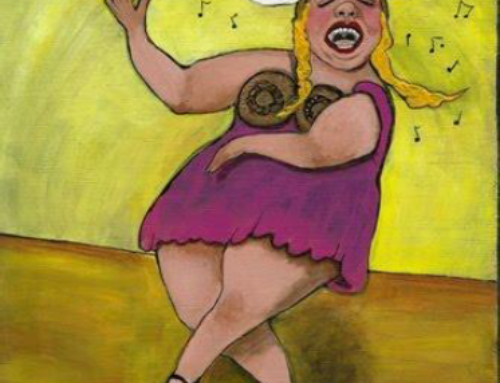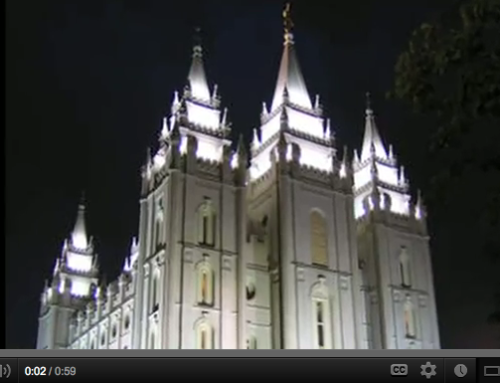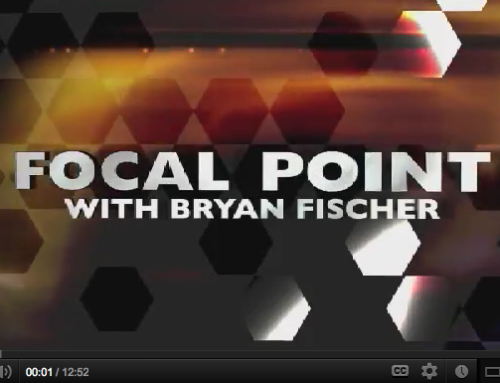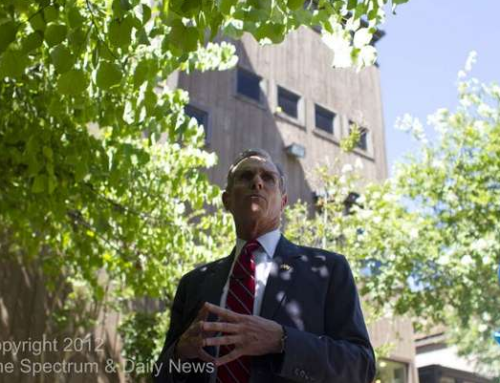 For link to story, CLICK HERE.
For link to story, CLICK HERE.
Fred Karger is a man to whom life has been very, very kind.
You can see it in the way he shows all of his teeth when he smiles, feel it in the way he squeezes your hand when he introduces himself, hear it in his easy yet firmly composed laugh. You can’t help thinking it, bitterly, as you pull up in front of his beach house off Pacific Coast Highway in Laguna Beach. The pictures in the little frames in his living room are meant to drive the point home, and they’re certainly impressive — there he is with Dianne Feinstein, and Jake Gyllenhaal, and the Clintons, way back before Chelsea learned how to work her own toothy grin.
It’s not surprising, upon meeting him and taking in the meticulously crafted package that is Fred Karger, that he is running for president of the United States.
At time of writing, Fred Karger is one of the three remaining candidates participating in the Republican primary. It’s Mitt Romney, Ron Paul, and Fred Karger. Never heard of him? Fred doesn’t mind. His campaign’s main catchphrase is “Fred Who?” It’s on his T-shirts and bumper stickers; it’s the title of his 2011 memoir.
Karger has a sense of humor about it. “I’m not delusional,” he says. “I know it’s a long shot.”
A very long one. While Karger looks every bit the presidential candidate, with horn-rimmed glasses and short-cropped sand-colored hair and that infectious smile, he’s not exactly Mitt Romney. For starters, he’s never held public office. He’s 62, but he’s never been married. He describes himself as an “activist.” He’s also an out gay man.
Running for president. Of the United States. On the Republican ballot.
But he’s not delusional. Fred Karger is on a mission.
* * *
Unlike his opponents, politics isn’t Karger’s motivation for running for president. Nor is it the prospect of the presidency itself. For him, it’s about telling his story as an out gay man, and the stories of thousands of others like him. It’s about using the considerable attention that comes with a presidential campaign to effect the change he believes our country needs. It’s also about the gravity of being the first openly gay person to run for president.
His memoir is punctuated by letters from supporters young and old, Republican and Democrat, voicing their admiration and gratitude for running — a fan named “P.” thanks him for “paving a way politically for the LGBT community, and what I believe to be the human race in general.”
Karger sees his campaign largely as a platform to improve visibility for the LGBT community. Take his latest campaign ad, produced to kick off his California publicity push in advance of the June 5th primary. “‘Sexy Frisbee’ Viral Video” features the candidate on the beach with a group of fitness models in bathing suits doing crunches and tossing Fred Frisbees, and ends with a kiss between two attractive, shirtless Caucasian men in Ray-Ban shades. It ran on several major networks in San Diego, Orange County and Los Angeles, and made headlines when it was removed from YouTube for “inappropriate” content.
“Every commercial I’ve done, there’s a subtle gay reference,” Karger says. “It was a ballsy thing to do, but I think we need to tell our stories. I think we need to get same-sex couples in mainstream advertising, not just in the Advocate or Logo. I want to normalize LGBT life so it will become like interracial marriage. It’s just normalizing who we are, and that is one of my major goals.”
Over the course of four hours, Karger used the terms activist or activism a total of six times to describe himself and his experience. Coming from a political world run by men and women who balk at the A-word — these days it sounds more Occupy, not Oval Office — it certainly casts him in a different light. Somehow, though, it’s difficult to picture Fred Karger in a tent in Zuccotti Park. Maybe this is what activists look like in Laguna Beach?
It began in 2006. Karger had retired two years earlier from a 30-plus-year career as a partner at the Dolphin Group, a political consulting firm in Los Angeles. “I didn’t want to just sit around and be a dilettante,” Karger recalls. “I wanted to do something significant.” So he did what any aspiring activist would do: He found a cause. The legendary local gay bar, The Boom Boom Room, was on the chopping block after the property was bought up by a conservative billionaire.
“It was a place that meant a lot to a lot of people,” Karger says. “People would come out from miles and miles away. It was a place where people could go to be themselves. No one wanted to see it go.”
So he “took on the Goliath.” With the help of some good press and political wrangling, the fight became international news. Though the bar eventually closed, it was this first very public fight on behalf of the LGBT community that led Karger, then 55, to his new calling: gay activist.
The transition challenged Karger, who had spent most of his career in the closet. “All of a sudden, there I was, out in the world, publicly proclaiming that I was gay. It was scary.”
Scary though it may have been, Karger didn’t go back into the sleepy, shadowy closet of retirement in Laguna Beach. In the months before Proposition 8 passed in California, Karger found his next opportunity to do something significant for his community. He organized large-scale boycotts of various businesses whose bosses had made large contributions to Yes on 8.
The boycott movements were an unqualified success, costing the offending companies millions. Once again, Karger received widespread media attention, garnering profiles of Fred Karger, Gay Activist, in the L.A. Times, the Washington Post, the New York Times and many others. “Suddenly, I became a hero,” Karger said. “Suddenly, the LGBT community said, ‘This guy rocks.'”
In his book, Karger writes, “I’ve become an activist so that younger people don’t have to go through what I went through.”
Clearly, he’s not referring to his “idyllic” childhood in an affluent Jewish family in suburban Illinois. He’s referring to the double life he led until he was 56 years old.
He describes being “afraid” of walking down the street with his boyfriend, of “panicking” when he thought he would be outed by someone who knew his secret. He tells a story of lies and fear, stomach-churning turmoil and self-hatred. It’s a story that’s all too familiar — and still poignant.
In a recent interview on Hardball with Chris Matthews, Karger talks about the “rainbow glass ceiling” faced by today’s gay men and women in politics, a “glass box” that prevents gay people from dreaming big and achieving their potential.
It’s something that held him back in his career, as the fear of coming out (or of being outed) stopped him from running for office until now. He told the L.A. Times last August, “When you’re gay and in the closet, you learn there are a lot of things you can’t do.”
* * *
Most of the profiles of Fred Karger the presidential candidate focus on his role as pioneer, while almost completely ignoring his policy points. It’s a disservice to a man who has worked hard to be more than a “one-issue candidate.”
Indeed, he’s built a solid set of policy fundamentals that define him, a must for any candidate. He’s got the requisite well-formulated plan to fix the economy, revolving around his “Jobs Now!” plan that would help connect businesses with qualified applicants, wherever they may be, in the hope of filling the 3.1 million jobs that remain unfilled around the country. With the help of a privately run entrepreneurial fund, he hopes to create a microlending system that would fundamentally change the way small business works in America.
Like many Republicans, he wants to balance the budget, and isn’t afraid to cut Social Security and Medicare to do it. But unlike many Republicans, he wants to raise taxes — except he’s careful to call it “revenue enhancement.”
He’s in favor of providing a Bush-style “path to citizenship” for undocumented immigrants, “to help them assimilate and pay taxes, and make them a part of this [country].” At the same time, he’s “not opposed to deploying troops and drone technology to secure both our borders.”
The main focus of his campaign, however, has been the legalization of same-sex marriage.
“Marriage is symbolic,” he says. “It sends the loudest, clearest message to anyone who’s LGBTQ that you are equal. You can have the same rights as your brother, or your cousin, or your best friend. A lot of people say, ‘I don’t want to get married, I don’t care.’ Well, it’s not about your personal position, it’s about what that message says. And I know because I had such a struggle, and I see so many people having struggles, and when marriage is the law of the land, that is the most important thing we can do.”
While his LGBTQ policy also includes getting ENDA passed and making DOMA history, the gay marriage fight is the keystone of his platform, and indeed, of his presidency. It is what has shaped him into the man he is today.
* * *
Over the course of a four-hour interview, the perpetually positive and energetic Karger seemed to consistently ignore one very large elephant in the room: The extent to which any of this means anything depends on how many people know who Fred Karger is — and how many of those people end up voting for him.
Karger attributes the relatively low impact of his campaign to the fact that he was kept out of the Republican debates, for reasons both legitimate (low poll numbers) and questionable (Fox News kept him out of one of the debates for which he qualified). He thinks things could have gone a lot differently, had he had at least modest support from LGBT organizations. Their support could have translated into large amounts of money, he said, that could have qualified him for certain debates and bought airtime, increasing exposure.
Groups like Human Rights Campaign and the National Gay and Lesbian Task Force have been largely silent since Karger began his campaign. Again, he’s not exactly surprised.
“My first trip to Washington, D.C. in February 2010, I met with the heads of all the organizations. I told them I was thinking of running for president. I asked for two things: Watch what I do, and keep an open mind… basically, I didn’t want them to badmouth me. And they’ve been very good on that. My unhappiness is from the fact that they haven’t taken it any further. I am disappointed, especially with the Victory Fund. What a difference [their support] would’ve made.”
The Victory Fund, an influential organization that backs gay candidates based on their background in public service and their chances of winning their races, passed on Fred Karger, the first openly gay man to run for president. “I’m a big supporter and I love what they do, but I think they should have been a part of this. What is history going to say?”
And it’s not just the movers and shakers. The reception from regular LGBTQ folks has been lukewarm, as well. “I knew that ‘gay Republican’ makes for an awfully good headline,” he says with a chuckle and a hint of smug satisfaction; unfortunately, it hasn’t won over the overwhelming majority of LGBTQ voters who remain firmly in the Democratic camp. “The LGBT community has become so partisan,” Karger says, the vaguest hint of frustration escaping his command. “I think it’s a little short-sighted. We have that attitude in this country, and it’s destroying our ability to get things done.”
But today, a few weeks after President Obama came out in support of same-sex marriage, and as gay men and women in state after state win the right to marry, the fight “to get things done” feels almost as if it’s already been won. A majority of Americans support same-sex marriage. It’s a matter of when, not if.
In many ways, so many people in this country have moved past gay marriage. The debate over Prop 8 has given way to genuinely productive discussions, in the media, in legislatures, and in schools, on the rights of trans individuals and school bullying, on the unique and complex needs of queer people of color. It’s not about marriage anymore — not completely, not really. For so many people, it’s not about “normalizing who we are” — it’s about finding ways to achieve real respect, real justice, that means something to real individuals, not all of whom are as meticulously put-together as the gay men of Laguna Beach.
So maybe it’s not just the Republican thing. Maybe some people feel that the first gay man to run for president should stand for more than marriage equality. Maybe they feel he should fight for the issues faced in communities that don’t look like his, for people who don’t look like him. Maybe it’s Fred Karger’s mission to “normalize” LGBT life that keeps him from being embraced by those who would otherwise find his bravery and vision inspiring.
For so many people in our community, whether because of their skin color or their gender identity or simply because they don’t look like the men and women in Karger’s campaign ads, marriage equality doesn’t even scratch the surface of the equality they desperately need. They don’t want to be “normal” — they never will be, not from Karger’s definition, and not from society’s.
And for them, that’s okay. As David Halperin wrote, “Queer is by definition whatever is at odds with the normal, the legitimate, the dominant. ‘Queer’ then, demarcates not a positivity but a positionality vis-à-vis the normative.” Many would argue further that those who aspire to normalcy perpetuate exactly that which they are trying to fight — while working for equality, for “normal” status, they grant their permission for society to continue to treat gay people as sub-normal, as sub-human.
In many ways, Fred Karger represents something larger than himself. He represents a choice that is facing the LGBTQ community. As more and more gay people gain a foothold in politics and respect from society, they must decide what to do with the power they’ve been given. As the community continues to make history, the question becomes ever more difficult to avoid: will Karger’s “normal” get us where we need to go?





